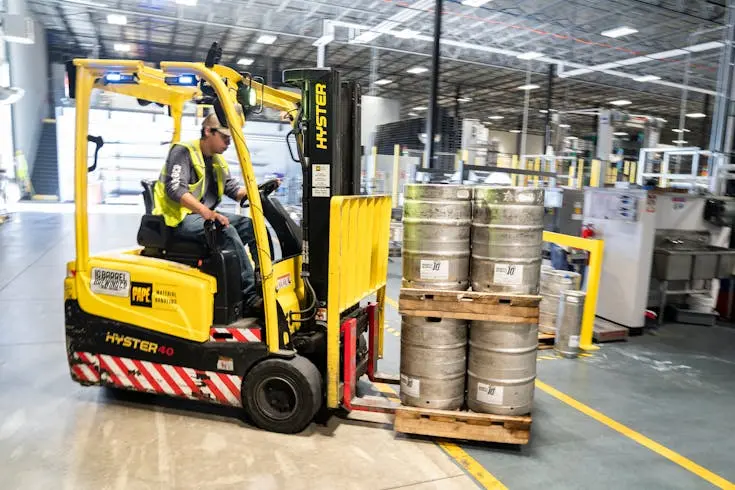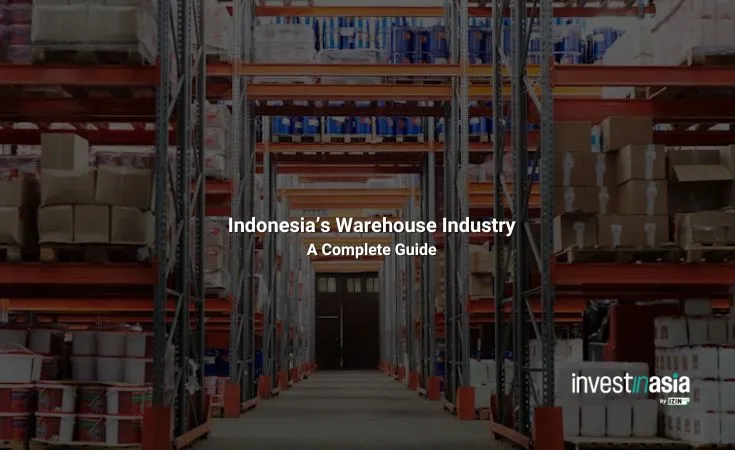If you’re evaluating Indonesia for warehousing, the short answer is: it’s growing fast, tech-ready, and increasingly friendly to foreign operators—provided you meet licensing and location rules upfront. Demand is led by e-commerce, manufacturing, and F&B cold chain, with strong policy support for logistics and green infrastructure.
Market Overview & What’s Driving Demand


Indonesia’s warehouse market has expanded strongly, with 2023 value estimates near USD 2.85B and multi-year growth projections exceeding general real estate.
Growth in 2024–2025 is fueled by e-commerce fulfillment, manufacturing shifts into Indonesia, and strong logistics networks centered on Java’s toll roads and major ports such as Tanjung Priok and the expanding Patimban port.
Below is an overview table of the warehouse industry in Indonesia:
| Metric | Value | Source |
| Market Value 2023 | USD 2.85 billion | Globe Newswire 2025 |
| Projected Market Value 2028 | USD 4.5+ billion | Various forecasts |
| CAGR 2025-2031 | 9.20% | 6Wresearch |
| Warehousing Growth 2024 | 9.56% | Central Bureau Statistics |
| Transportation & Warehousing Growth 2025 | 12.53% | Supply Chain Indonesia |
| Logistics Market Size 2023 | IDR 150 trillion | Trace Data Research |
| Projected Logistics Market 2029 | USD 152.54 billion | Market Intelligence |
| Cold Storage Market Size 2025 | USD 7.15 billion | Mordor Intelligence |
| Cold Storage CAGR 2025-2032 | 10.10% | GMI Research |
Also read: Major Industries in Indonesia (Based on Contribution to GDP)
Key Segments You Should Know
- Industrial freight warehouses handle high-velocity retail and auto/electronics flows.
- Cold storage is the fastest-growing niche due to F&B and pharma, with double-digit CAGR outlooks.
- Bonded warehouses / PLB allow duty and VAT suspension until release, improving working capital for importers and regional distributors.
- ICD/CFS nodes and custom warehouses improve port-side velocity for export-import cargo.
Also read: Top Foreign Investment Sectors in Indonesia
The Ecosystem: Tech, Automation, and Data
Modern operators deploy WMS integrated with ERP, real-time inventory, and dock scheduling. RFID, AS/RS, and AMRs reduce error rates and cycle times while lifting throughput. The technology ecosystem includes both domestic WMS providers and global platforms like SAP EWM, Manhattan, NetSuite, and Blue Yonder.
Accuracy gains above 99% and 40% faster order processing are achievable with end-to-end digitization.
Sustainability & Green Warehousing
Power prices and ESG targets push facilities toward solar rooftops, daylighting, and automation for energy efficiency. Presidential Regulation No. 98/2021 underpins carbon accounting and credit pathways, encouraging eco-design and green retrofits. Best-in-class sites report ~10% energy savings from renewables today, with larger wins from integrated design in new builds.
Also read: Investment Incentives for Green Tech and Renewable Energy Projects in Indonesia
Where to Build: Strategic Locations


- Greater Jakarta holds >40% share, anchored by Tanjung Priok and Soekarno-Hatta International Airport, and estates like Jababeka and GIIC.
- Central Java (Semarang/Kendal) offers cost advantages and rising manufacturing bases.
- East Java (Surabaya/Tanjung Perak) is the gateway to Eastern Indonesia. Multi-story projects are increasing in land-constrained districts near core urban demand.
Here are the advantages of each region:
| Region | Key Advantages |
| Java | Population density, port access |
| Greater Jakarta | Tanjung Priok Port proximity |
| Central Java | Strategic location, lower wages |
| East Java (Surabaya) | Second busiest port |
| Sumatra | Natural resources |
| Sulawesi | Regional hub |
| Kalimantan | Mining, plantation |
| Eastern Indonesia | Fisheries, tourism |
Also read: Bonded Warehouses in Indonesia: A Complete Guide for Foreign Investors
Regulation & Licensing (What Foreign Investors Must Get Right)
Your operating stack usually includes:
- NIB (Business Identification Number) via OSS-RBA.
- TDG (Warehouse Registration Certificate) with proof of premises, location/zoning, fire certificate, and environmental compliance (UKL-UPL/AMDAL).
- For bonded status: customs approvals via INSW, VAT registration, and bonded operator recommendations.
- OHS policies, CCTV and access control aligned with Indonesia’s Personal Data Protection Law guidelines.
Advantages vs Challenges
Advantages: Huge urban market, resilient consumer demand, improving ports/roads, tax efficiencies via bonded schemes, and a maturing tech ecosystem.
Challenges: Land scarcity and zoning in Java, road-heavy distribution (congestion), skilled labor gaps, and capex for automation in SMEs. Diversifying to Central/East Java and phased capex can mitigate risk.
Government Support & Future Projection
Policy emphasizes logistics competitiveness, inter-island connectivity, and digitalization. With projects like Patimban Deep Sea Port, TEU handling and export flows should improve, while PLB and SEZ/industrial estates streamline customs and utilities. Expect broader AI/IoT adoption, higher green standards, and more vertical (multi-story) designs in metro zones.
Regional Comparison (Investor Lens)
Indonesia vs Vietnam/Thailand/Malaysia: Indonesia offers the largest consumer base and deep domestic demand, which stabilizes warehouse utilization beyond export cycles. Vietnam and Thailand may offer faster export processing in some corridors, while Malaysia can present stronger port productivity in select hubs.
Indonesia’s competitive advantage lies in its scale and the availability of bonded/PLB facilities—provided businesses secure the right strategic location and necessary licenses.
Also read: Comparing Indonesia’s Foreign Business Entry Barriers vs. Other ASEAN Countries
How Foreigners Can Start a Warehouse Company (Step-by-Step)
- Choose structure: Set up a PMA (foreign-owned limited company).
- Reserve name & deed: Notarial deed and Ministry ratification.
- OSS-RBA onboarding: Obtain NIB, tax number, and sector KBLI.
- Location & land: Lease or buy industrial/warehousing-zoned land; verify spatial plan and building permits.
- Environmental & safety: UKL-UPL/AMDAL, fire safety, evacuation plans, OHS standards.
- TDG issuance: Submit required documents plus site plan and boundary proofs.
- (Optional) Bonded status: Apply through INSW with customs inspections and systems readiness.
- WMS & SOPs: Implement WMS, inventory controls, CCTV & access management aligned with PDP Law guidance.
- Talent & certification: Hire certified team (e.g., BNSP Warehouse Operation Officer).
- Go-live & audit: Pilot operations, cycle counts, and KPI dashboards.
Launching a compliant PMA, navigating OSS-RBA, securing TDG, and, if needed, bonded approvals can be complex and time-sensitive. InvestinAsia’s Indonesia Company Registration service streamlines each step, so you can focus on sites, SOPs, and revenue.
Ready to start? Chat with us now for FREE consultation!
FAQs
What license do I need to operate a warehouse in Indonesia?
You need NIB via OSS and TDG for the warehouse, plus environmental and fire safety approvals; bonded status requires separate customs approval.
Can a foreign company own and run a warehouse?
Yes, via a PMA company. Many operators run standard or bonded facilities through foreign-owned entities.
How long does TDG take?
Timelines vary by region and document completeness; plan for pre-site readiness (zoning, environmental, fire) before filing.
What is a bonded warehouse (PLB)?
A customs facility where import duties and VAT are suspended until goods are released to the domestic market or re-exported.
Where are the best warehouse locations?
Greater Jakarta for demand density and port/airport access; Central and East Java for balanced costs and connectivity.
Do I need a WMS from day one?
Not mandatory, but recommended. WMS reduces errors, improves visibility, and accelerates audits—critical for bonded or multi-client sites.
References:
ALI (2024). Green warehouse: Trend logistik di 2024. Alinea.id. https://www.alinea.id/bisnis/green-warehouse-tren-logistik-di-2024-b2k0y9P6c.Mordor Intelligence. (2025). Indonesia freight & logistics market. https://www.mordorintelligence.com/industry-reports/indonesia-freight-logistics-market.
Soltius. (n.d.). Warehouse Management System concepts. https://www.soltius.co.id/id/blog/konsep-warehouse-management-system-yang-wajib-anda-tahu.
Statista. (2025). Transportation & logistics outlook – Indonesia. https://www.statista.com/outlook/mmo/transportation-logistics/indonesia.
Presidential Regulation No. 98 of 2021. Carbon Economic Value and GHG control. (Cited in sustainability section).
LMI Consultancy. (n.d.). Warehouse license in Indonesia. https://www.lmiconsultancy.com/indonesia/warehouse-license-in-indonesia/.
INSW (n.d.). Indonesia National Single Window. https://insw.go.id (Referenced via bonded licensing).




